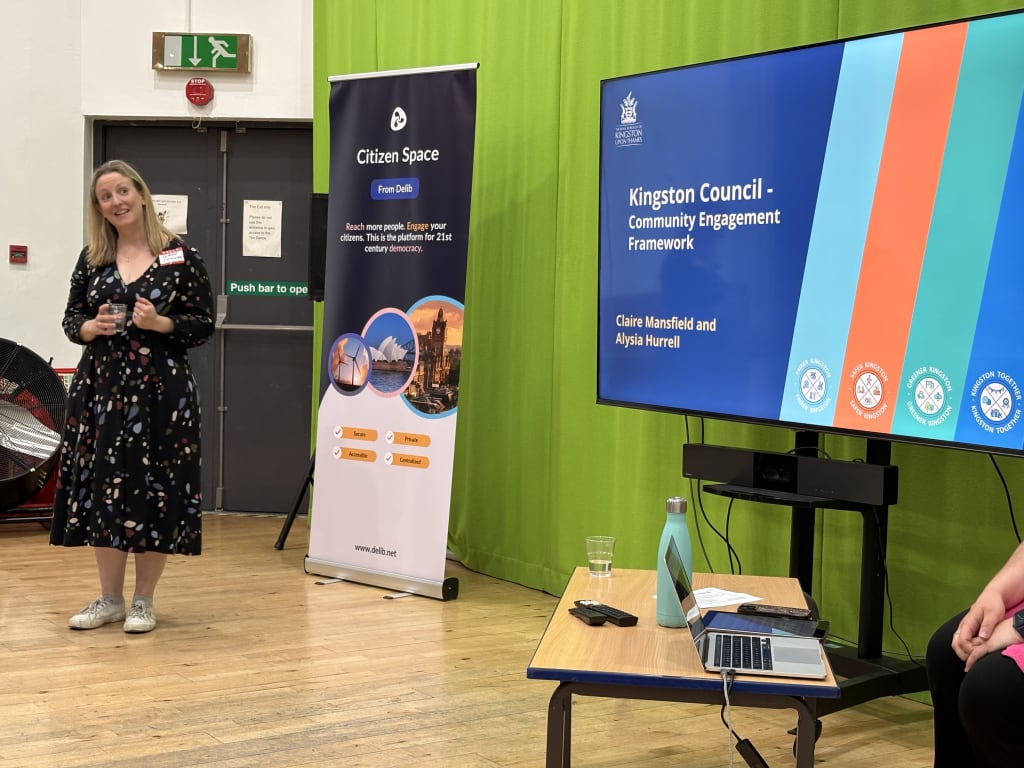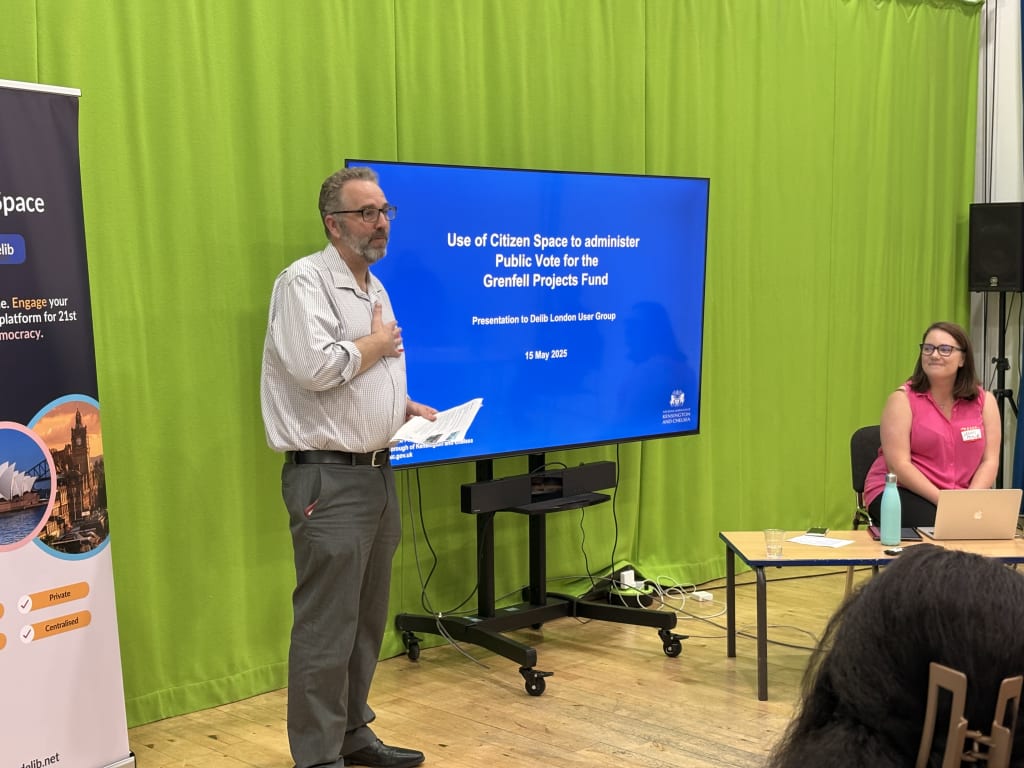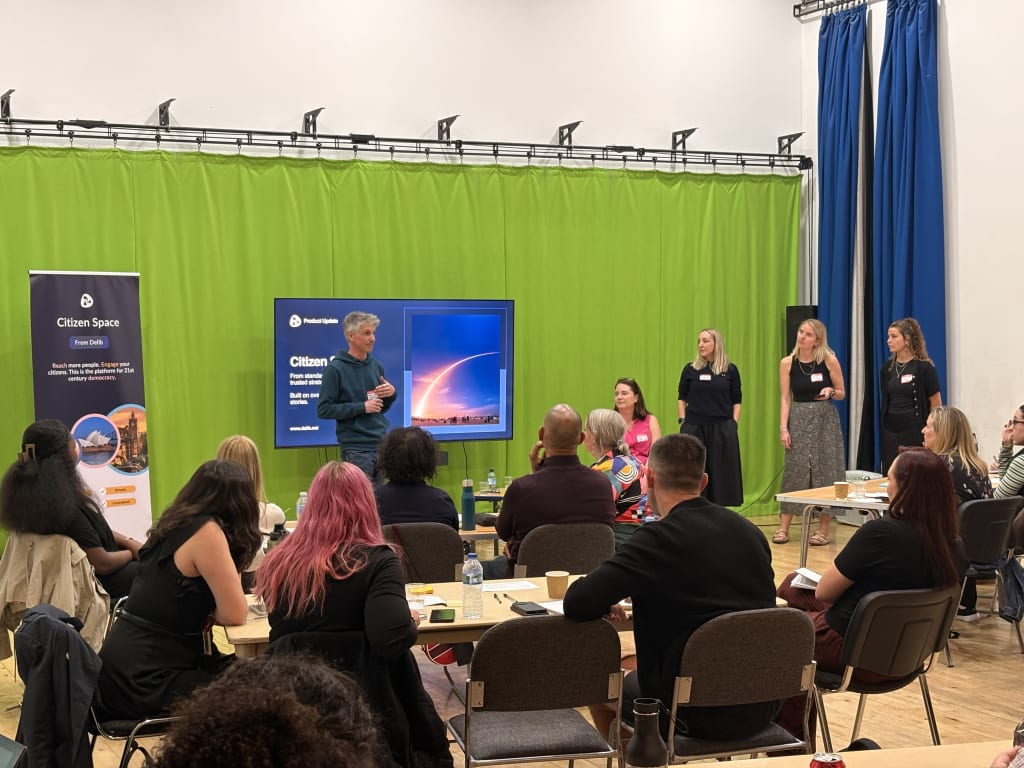Last month, a handful of us from Delib and over thirty representatives from nearly twenty of the organisations we work with gathered in Covent Garden’s Dragon Hall in Central London for our latest User Group. (If you haven’t attended a Delib User Group before, you can learn more about what they are and why we host them in my blog post about our last one in Birmingham.) In brief, User Groups are fantastic opportunities for connecting, networking and sharing knowledge with fellow engagement professionals – in real life, rather than via screens . Moreover, we at Delib had some big news: the much-anticipated launch of version 8 of our flagship Citizen Space platform.
I kicked off the day with a short presentation building on my colleague Tiffany Maddox’s excellent Impact Report, which she launched at the last User Group. I updated some of the stats from the report, including a pretty remarkable 21% increase in the number of activities published on Citizen Space from 2023 to 2024. We also saw an incredible 1.2 million responses submitted via Citizen Space last year. While that’s indisputably a big number, it represents something even bigger: 1.2 million times someone had the opportunity to make their voice heard about a subject they care about, whether that was a change to our nation’s laws or the layout of their child’s favourite park. At a time when it feels as though faith in democracy is eroding, that is a really significant testament to the amazing work our customers do every day.
I rounded off my presentation with a recap of some of the upgrades and enhancements made to Citizen Space by our team of tireless and resourceful engineers just in the few months since we last brought everyone together for a User Group. The list covered everything from the recent integration of ArcGIS into our Geospatial mapping tool to the new real-time character count on free text boxes. Our engineers are working under the bonnet of Citizen Space every single day and some of the most important work they do is invisible to users, yet absolutely fundamental to both the quality of the Citizen Space user experience and, crucially, the security of the data our customers trust us to process.

Next we heard from Claire Mansfield, Corporate Participation and Engagement Manager, and Alysia Hurrell, Participation and Engagement Officer, from the Royal Borough of Kingston-upon-Thames. The main theme of Claire and Alysia’s presentation was their council’s Community Engagement Framework. First introduced in 2019, the framework is a commitment to “hardwire” effective engagement practices at every level of decision making by developing an engagement toolkit for staff, creating shared consultation templates to ensure consistency, establishing a central engagement repository for reference purposes, and more closely monitoring the diversity of respondents. The council has updated the framework this year to produce a more concise and less narrative document more tightly focused on the council’s seven key engagement principles, organised under three themes: More inclusive engagement; Widening our reach; and Strengthening evaluation and feedback.
By establishing a new culture and approach to engagement within the organisation, the key engagement principles resulted in residents having more time and clearer instructions on how to engage, as well as more opportunities to co-produce and influence policy through Citizens’ Assemblies and Residents’ Panels. While some of these outcomes can, by their nature, be difficult to quantify, Claire and Alyssia shared one stat that really drove home the point: The Royal Borough of Kingston-upon-Thames had 103,000 visits to their Citizen Space site last year, nearly four times as many as they had to their previous online engagement platform in 2019 when they launched the Community Engagement Framework.
The Royal Borough of Kingston-upon-Thames had 103,000 visits to their Citizen Space site last year, nearly four times as many as they had to their previous online engagement platform in 2019
Claire and Alysia went on to discuss some of the ways they use their Citizen Space and Dialogue platforms, notably their use of Citizen Space’s Saved Pages function to ensure that consistency they mentioned earlier in their presentation. Alysia spoke about their successes with Dialogue, which took far less moderation than she had at first anticipated and which, in her own words, she is “enjoying figuring out”! They have run four highly successful public Dialogue challenges so far and were just about to launch a private challenge for council staff. In brief, it was a fascinating insight into the Kingston-upon-Thames engagement team’s approach which prompted a lot of questions from the audience and a lively discussion in the Q&A.
Following Claire and Alysia was Gary Wilson, Head of Consultation and Participation at the Royal Borough of Kensington and Chelsea. Gary delivered an excellent presentation about how his council administered the public votes for the Grenfell Projects Fund. Established in the wake of the Grenfell fire tragedy in 2017, the Grenfell Projects Fund distributed money to various organisations supporting community-led recovery in North Kensington. The council worked closely with the North Kensington Residents’ Panel to co-design the fund and at the heart of this was a guarantee that local residents would determine how it was disbursed via a public vote.

Gary then took us through the four rounds of public voting held so far, explaining how Citizen Space had become increasingly central to the process. From Round One in 2019 that was conducted entirely in person and had no online component whatsoever, to an online approach using Citizen Space and supported by in-person sessions for Rounds Two and Three, delivered concurrently in 2022 due to Covid-related delays, to a much more successfully hybridised process for Round Four held earlier this year.
Gary took us through each iteration of the public vote process, detailing what worked well, what worked less well, the lessons learned at each stage and how he and his team refined their use of Citizen Space to address these as the process advanced. It was a really compelling account of a collaborative engagement between citizens and government in an extremely difficult context of genuine tragedy and a fair degree of suspicion and mistrust. The insight and candour with which Gary delivered it was hugely appreciated by the audience – as evidenced by the fact that questions for Gary went on for ten minutes longer than his allotted time in the agenda and would certainly have gone on much longer if we could have permitted it!
Next, we had a pre-recorded video contribution from Delib’s Product Manager Lauren LaRocca in which Lauren discussed the work Delib are doing around that hottest of topics, Artificial Intelligence (AI). Lauren addressed the potential pitfalls, both technical and ethical, and the opportunities associated with using AI to analyse response data, and explained Delib’s evolving approach to this question in more detail. This prompted an open discussion in the room during which attendees shared their experiences, questions, hopes and concerns about this world-historical new technology and how it will impact our work of engaging and consulting with citizens.

Finally, the User Group heard from Delib’s managing director and founder Andy Parkhouse, our chief operating officer Louise Cato, our chief customer officer Jessie Ashmore, and our user experience designer Elissa Watson about version 8 of Citizen Space. Version 8 is the single biggest upgrade to the platform in many, many years and needless to say we’ll be sharing a lot more information about the new features and enhancements nearer the launch date. Suffice to say here that Andy, Jessie and Louise explained some of the history and reasoning behind the changes we are developing, while Elissa spoke about the intuitive new and improved user interface she has developed to support version 8’s new technical features. It really looks fantastic and we all at Delib are super excited to be able to share it with you soon.
Many thanks to all of our brilliant guest speakers, the wonderful staff of the Dragon Hall in Covent Garden for helping us host such a great event, and to everyone at Delib who made this happen: Jenni Weech, Ben Griggs, Natalie Williams, David Blayney, Krista King and Shaney Orrowe. Disappointed you missed this User Group? Fear not: we are hosting another in Edinburgh on Tuesday 24 June. We’ll have a whole new agenda of customer presentations to share with you, plus Andy and Eli will be back to talk more about Citizen Space version 8. Tickets are moving fast so don’t delay in booking yours here.